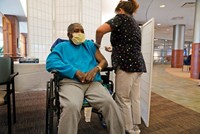Advertisement
Grab your lab coat. Let's get started
Welcome!
Welcome!
Create an account below to get 6 C&EN articles per month, receive newsletters and more - all free.
It seems this is your first time logging in online. Please enter the following information to continue.
As an ACS member you automatically get access to this site. All we need is few more details to create your reading experience.
Not you? Sign in with a different account.
Not you? Sign in with a different account.
ERROR 1
ERROR 1
ERROR 2
ERROR 2
ERROR 2
ERROR 2
ERROR 2
Password and Confirm password must match.
If you have an ACS member number, please enter it here so we can link this account to your membership. (optional)
ERROR 2
ACS values your privacy. By submitting your information, you are gaining access to C&EN and subscribing to our weekly newsletter. We use the information you provide to make your reading experience better, and we will never sell your data to third party members.
Infectious disease
Newscripts
James Bond’s great escapes from pathogens, and vax is the word of 2021
by Laura Howes
November 21, 2021
| A version of this story appeared in
Volume 99, Issue 42
No time to die

As the weather gets cold and darkness falls earlier in the Northern Hemisphere, this Newscriptster likes nothing better than curling up with something good to watch: competitive baking shows, an old sitcom, or maybe a movie. Malaria researcher Wouter Graumans’s choice would probably be a James Bond film.
Graumans, who is working toward a PhD at Radboud University, loves Bond movies and rewatches all the films every year. But one thing recently struck him. Whenever Graumans or one of his tropical medicine colleagues travels abroad for work, he says, “No matter what we do, we get sick.” How does the most famous member of Her Majesty’s secret service avoid infection?
Starting last April, Graumans and fellow malaria researchers Teun Bousema and Will Stone spent their evenings rewatching 007’s missions. But this time they were taking notes. The researchers soon realized that the secret agent risks life and limb not only with lasers, car chases, and gunfights—but also a host of infectious diseases.
The first film Graumans watched was Dr. No. In the 1962 classic starring Sean Connery, Bond travels to Jamaica to investigate the disappearance of another British secret agent. Instead of just enjoying the story, Graumans started noting everything important from a health perspective. He soon saw things he hadn’t paid attention to before. As Bond walked through a swamp, for example, he battled with mosquitoes. At the time, Jamaica was dealing with an outbreak of dengue fever, a mosquito-borne disease. “I’d never thought about this before,” Graumans says.
The three researchers worked their way through 25 Bond films. Their published analysis found that sexual health was an obvious concern, given the number of Bond’s documented casual liaisons. Other researchers have previously raised these concerns (Scott. Med. J. 2018, DOI: 10.1177/0036933018809601). Bond also regularly risks food poisoning and multiple tropical illnesses, as well as snakebites, decompression sickness, and even heat- and sunstroke (Travel Med. Inf. Dis. 2021, DOI: 10.1016/j.tmaid.2021.102175).
The research paper is also up to date with respect to the most recent Bond film, No Time to Die, released earlier this year. Graumans and colleagues were probably the only cinemagoers taking notepads into the movie theater, Graumans jokes, but several sections of their academic paper were rewritten on the basis of data from that film. So yes, their paper contains spoilers.
Graumans says their analysis shows that MI6 may not be preparing Bond adequately for his trips. Q should start work on an extensive medical kit for all 00s, he suggests.
But has the new perspective ruined Graumans’s love of Bond? He admits that was something he worried about, but the same week that Graumans spoke to Newscripts, he watched one of the old movies again. He’s pleased to report he still enjoys them as much as before. But he’ll take travel medicine advice from the experts, not 007.
Vax is the word

The COVID-19 vaccine rollout has boosted not just our immune systems but also our language. According to an analysis by Oxford Languages, the lexicography arm of Oxford University Press, the word vax as a shorthand for vaccine has been used 72 times as frequently in English in 2021 compared to 2020. That dramatic uptick prompted the language experts to crown vax 2021’s Word of the Year.
The report explains that the word vaccine was first recorded in English in 1799 after Edward Jenner’s work on smallpox, but the shorter vax has been used only since the late 20th century. Initially part of trademarks, vax as a noun was first recorded in 1983 and as a verb in 2009.
The Oxford linguists also mention regional variations for words relating to vaccination. For example, jab is a much more common term in British English, while Americans favor getting a shot.
Please send comments and suggestions to newscripts@acs.org.





Join the conversation
Contact the reporter
Submit a Letter to the Editor for publication
Engage with us on Twitter